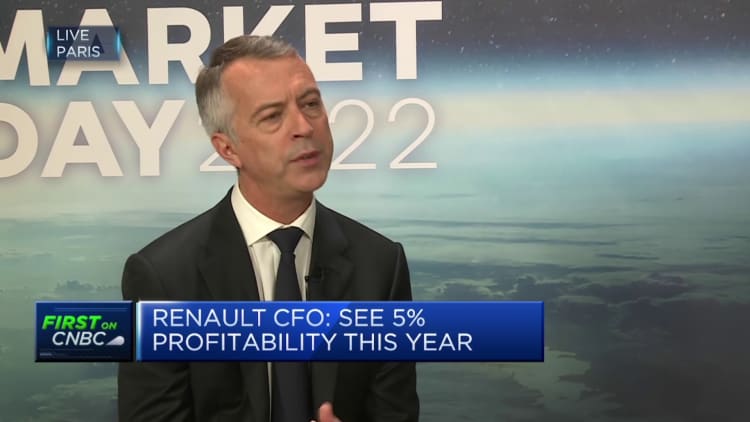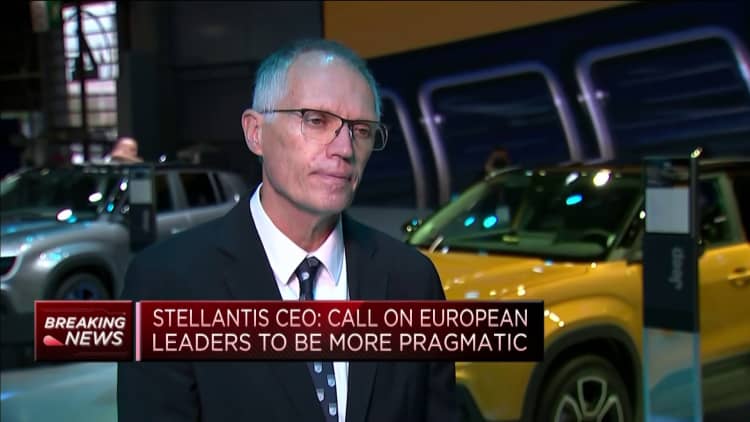[ad_1]

Renault sees the internal combustion engine continuing to play a crucial role in its business over the coming years, according to a top executive at the French automotive giant.
On Tuesday, it was announced that the Renault Group and Chinese firm Geely had signed a non-binding framework agreement to establish a company focused on the development, production and supply of “hybrid powertrains and highly efficient ICE [internal combustion engine] powertrains.”
According to Renault, both itself and Geely will have a 50% stake in the business, which will consist of 17 powertrain facilities and five research and development centers.
Speaking to CNBC’s Charlotte Reed on Tuesday, Renault Chief Financial Officer Thierry Pieton sought to explain some of the reasoning behind the planned partnership with Geely.
“In our view, and according to all the studies that we’ve got, there is no scenario where ICE and hybrid engines represent less than 40% of the market with a horizon of 2040,” he said. “So it’s actually … a market that’s going to continue to grow.”
The tie-up with Geely comes as Renault fleshes out plans to establish an EV spin-off called Ampere.
According to Renault, France-based Ampere “will develop, manufacture, and sell full EV passenger cars.” It’s eyeing an initial public offering on the Euronext Paris, which would take place in the second half of 2023 at the earliest, subject to market conditions.
During his interview with CNBC, Pieton touched upon the need, as he saw it, for different types of vehicles. “It’s very important to have, at the same time, the development of our electric vehicle business on one side — with Ampere — and to build a sustainable source of ICE and hybrid powertrains.”
This was why Renault was going into a partnership with Geely, he added, explaining the move represented “an absolute slam dunk” from a business and financial perspective.
This was because, Pieton argued, it created “a world-leading supplier of ICE and hybrid powertrains with around 19,000 employees in the world, covering 130 countries.”
In comments sent to CNBC via email, David Leggett, an analyst at GlobalData, noted that automotive manufacturers could still enjoy profits from the sale of vehicles that used internal combustion engines.
“Margins are generally higher than on electric vehicles, which are relatively costly to manufacture,” he said.
“The gap will eventually narrow as EV volumes rise sharply and unit costs on major EV components fall significantly, but there is still much profitable business to be done on ICEs and hybrids and will be for some time to come,” he added.
“Manufacturers need to be flexible in their powertrain offerings according to market needs — which differ across the world.”
Renault’s continued focus on the internal combustion engine comes at a time when some big economies are looking to move away from vehicles that use fossil fuels.
The U.K., for example, wants to stop the sale of new diesel and gasoline cars and vans by 2030. It will require, from 2035, all new cars and vans to have zero tailpipe emissions.
The European Union, which the U.K. left on Jan. 31, 2020, is pursuing similar targets. Over in the United States, California is banning the sale of new gasoline-powered vehicles starting in 2035.

Such targets have become a major talking point within the automotive industry.
During a recent interview with CNBC, the CEO of Stellantis was asked about the EU’s plans to phase out the sale of new ICE cars and vans by 2035.
In response, Carlos Tavares said it was “clear that the decision to ban pure ICEs is a purely dogmatic decision.”
Expanding on his point, the Stellantis chief said he would recommend that Europe’s political leaders “be more pragmatic and less dogmatic.”
“I think there is the possibility — and the need — for a more pragmatic approach to manage the transition.”
Source link



